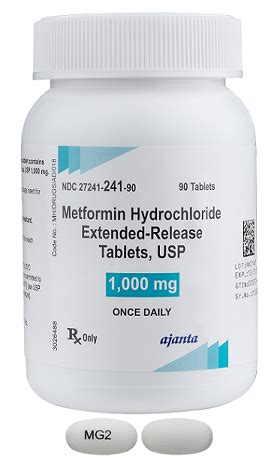Intro
Discover the essential facts about Metformin 1000 mg, a widely prescribed diabetes medication. Learn about its uses, benefits, and potential side effects. Understand how it works to control blood sugar levels, and explore its interactions with other medications. Get informed about the proper dosage, precautions, and contraindications to ensure safe and effective treatment.
If you're living with type 2 diabetes, you're likely no stranger to the various medications available to help manage your condition. One of the most commonly prescribed oral medications for type 2 diabetes is metformin, specifically metformin 1000 mg. But what exactly is metformin, and how does it work? In this article, we'll delve into the world of metformin 1000 mg, exploring its benefits, potential side effects, and what you can expect when taking this medication.

Metformin is a biguanide medication that works by decreasing glucose production in the liver, improving the body's sensitivity to insulin, and facilitating glucose uptake in the muscles. When taken as directed, metformin 1000 mg can help regulate blood sugar levels, reducing the risk of complications associated with type 2 diabetes.
What Are the Benefits of Metformin 1000 Mg?
Metformin 1000 mg offers numerous benefits for individuals with type 2 diabetes. Some of the most significant advantages of this medication include:
-
Improved Blood Sugar Control
Metformin 1000 mg helps regulate blood sugar levels by reducing glucose production in the liver and increasing insulin sensitivity. This can lead to better blood sugar control, reducing the risk of complications such as kidney damage, nerve damage, and vision problems.
-
Weight Loss
Unlike some other diabetes medications, metformin 1000 mg is not associated with weight gain. In fact, many people taking metformin experience weight loss, which can further improve blood sugar control and overall health.
-
Cardiovascular Benefits
Studies have shown that metformin 1000 mg may have cardiovascular benefits, including reducing the risk of heart attack, stroke, and death from cardiovascular disease.
How Does Metformin 1000 Mg Work?
So, how exactly does metformin 1000 mg work to improve blood sugar control? The medication works in several ways:

-
Decreasing Glucose Production in the Liver
Metformin 1000 mg reduces glucose production in the liver by inhibiting the enzyme responsible for glucose production. This leads to lower blood sugar levels.
-
Improving Insulin Sensitivity
Metformin 1000 mg improves the body's sensitivity to insulin, allowing glucose to enter the cells more efficiently. This reduces blood sugar levels and improves overall insulin function.
-
Facilitating Glucose Uptake in the Muscles
Metformin 1000 mg facilitates glucose uptake in the muscles, reducing blood sugar levels and improving muscle function.
Potential Side Effects of Metformin 1000 Mg
While metformin 1000 mg is generally well-tolerated, there are potential side effects to be aware of. Some common side effects include:
-
Gastrointestinal Issues
Metformin 1000 mg can cause gastrointestinal issues such as diarrhea, nausea, and vomiting. These side effects are usually mild and temporary.
-
Headaches
Some people taking metformin 1000 mg may experience headaches, although this is relatively rare.
-
Fatigue
Metformin 1000 mg can cause fatigue, which is often mild and temporary.
What to Expect When Taking Metformin 1000 Mg
When taking metformin 1000 mg, it's essential to follow your doctor's instructions carefully. Here are some things to expect:

-
Regular Blood Sugar Monitoring
Regular blood sugar monitoring is crucial when taking metformin 1000 mg. This will help you track your progress and make any necessary adjustments to your treatment plan.
-
Dietary Changes
Metformin 1000 mg works best when combined with a healthy diet and regular exercise. Your doctor may recommend dietary changes to help you manage your blood sugar levels.
-
Regular Check-Ups
Regular check-ups with your doctor are essential to monitor your progress and make any necessary adjustments to your treatment plan.
Interactions and Contraindications
Metformin 1000 mg can interact with certain medications, including:
-
Warfarin
Metformin 1000 mg can increase the risk of bleeding when taken with warfarin.
-
Cimetidine
Cimetidine can increase the levels of metformin 1000 mg in the blood, increasing the risk of side effects.
Contraindications for metformin 1000 mg include:
-
Kidney Disease
Metformin 1000 mg is not recommended for individuals with severe kidney disease.
-
Liver Disease
Metformin 1000 mg is not recommended for individuals with liver disease.
What is metformin 1000 mg used for?
+Metformin 1000 mg is used to treat type 2 diabetes by reducing glucose production in the liver, improving insulin sensitivity, and facilitating glucose uptake in the muscles.
What are the potential side effects of metformin 1000 mg?
+Potential side effects of metformin 1000 mg include gastrointestinal issues, headaches, and fatigue.
Can I take metformin 1000 mg with other medications?
+Metformin 1000 mg can interact with certain medications, including warfarin and cimetidine. It's essential to consult with your doctor before taking metformin 1000 mg with other medications.
In conclusion, metformin 1000 mg is a commonly prescribed oral medication for type 2 diabetes that offers numerous benefits, including improved blood sugar control, weight loss, and cardiovascular benefits. While potential side effects and interactions exist, metformin 1000 mg is generally well-tolerated and effective when taken as directed. If you're living with type 2 diabetes, consult with your doctor to determine if metformin 1000 mg is right for you.
We hope this article has provided you with a comprehensive understanding of metformin 1000 mg. If you have any further questions or concerns, please don't hesitate to comment below or share this article with others.
